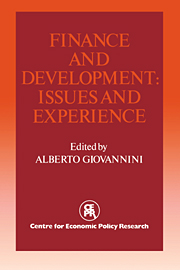Book contents
- Frontmatter
- Contents
- List of figures
- List of tables
- Preface
- List of conference participants
- 1 Introduction
- PART I THE ROLE OF FINANCE IN ECONOMIC DEVELOPMENT
- 2 International finance and economic development
- 3 A theory of financial development
- 4 Capital market imperfections and regional economic development
- 5 Convergence in the closed and in the open economy
- PART IIA CASE STUDIES – FINANCIAL MARKETS AND ECONOMIC DEVELOPMENT
- PART IIB CASE STUDIES – GOVERNMENT POLICIES
- PART III DEVELOPMENT FINANCE
- Index
4 - Capital market imperfections and regional economic development
Published online by Cambridge University Press: 05 November 2011
- Frontmatter
- Contents
- List of figures
- List of tables
- Preface
- List of conference participants
- 1 Introduction
- PART I THE ROLE OF FINANCE IN ECONOMIC DEVELOPMENT
- 2 International finance and economic development
- 3 A theory of financial development
- 4 Capital market imperfections and regional economic development
- 5 Convergence in the closed and in the open economy
- PART IIA CASE STUDIES – FINANCIAL MARKETS AND ECONOMIC DEVELOPMENT
- PART IIB CASE STUDIES – GOVERNMENT POLICIES
- PART III DEVELOPMENT FINANCE
- Index
Summary
The role of monetary and, more broadly, financial market interventions in promoting regional growth is an increasingly important economic issue. It has been a commonplace of traditional economic theory that national monetary policy is an important tool for promoting macroeconomic stability and growth. Yet little attention has been paid to the impact of monetary and financial policy on the pattern of economic activity across regions of a particular national economy. In traditional models, the reason for this seems clear, if rarely stated explicitly. Within any national economy, free capital mobility and a common currency will ensure that interest rates are equal across regions. Since monetary policy has traditionally been viewed as operating through interest rates, common interest rates mean that monetary policy should be neutral in its regional impact. Indeed, with nationally integrated financial markets, arbitrage should maintain equality of local interest rates even in the face of deliberate efforts to subsidize local capital investment; thus defeating the purpose of the original subsidies. Consequently, monetary and currency integration in Europe (and elsewhere) which reduces existing national economies to regional status should, in this view of the world, all but eliminate the possibility of local monetary stimulation of formerly national economies. Regional monetary changes would simply be translated into attenuated movements in transnational interest rates. Whether the resulting loss in policy flexibility is desirable depends largely on one's view of the likely efficacy of government interventions in general.
- Type
- Chapter
- Information
- Finance and DevelopmentIssues and Experience, pp. 65 - 98Publisher: Cambridge University PressPrint publication year: 1993
- 8
- Cited by



